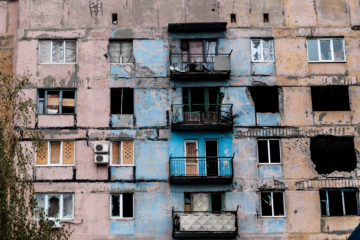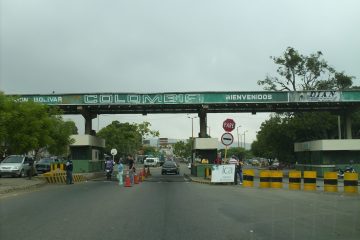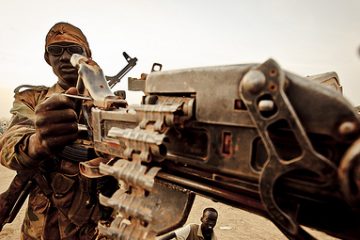When the technical is political: Colombia’s export of security expertise
In a farewell speech to Colombia’s armed forces last year just prior to leaving office, ex-president Juan Manuel Santos boasted: “Today we have the best armed forces in our history.” Proudly, he added: “We’re a global reference!” And indeed, it seems as though Colombia had opened a new chapter. Since the 2016 peace accords with the country’s largest guerrilla organisation, the FARC (Revolutionary Armed Forces of Colombia), the nation appears to be on an uphill climb. With the FARC at the negotiation table, the story goes, the country was finally able to look ahead and dedicate its resources to transition and reconstruction: the reintegration of former combatants, the redistribution of formerly occupied territories, and the recovery of an economy weakened by decades …
A Contrarian View of Turkey’s Incursion into Northern Syria
Global attention has focused on the Middle East once more after Turkey launched a military operation, named Peace Spring, moving into Northern Syria. The incursion was made possible by the prior withdrawal of US troops. Beforehand, there was little outwardly indication of the troubles to come: Daesh’s territory was conquered and the US and Turkey cooperated in the region. However, everything started to fall apart after the phone call between President Erdogan and President Trump, in which he agreed to withdraw US troops from Northern Syria, became public. Since then, commentators have criticized President Trump’s decision to withdraw, and Turkey’s actions and intentions. It has been claimed that Turkey is solely motivated by its conflict with Kurdish forces, who have …

Most people in separatist-held areas of Donbas prefer reintegration with Ukraine – new survey
With renewed negotiations to end the conflict in Ukraine’s Donbas region on the horizon, the views of those people most affected by the war – the residents of eastern Ukraine – should be taken into account. Russia insists that the people living in areas of the Donbas currently controlled by separatists, who it supports, do not what to reintegrate with Ukraine. But two surveys I carried out in the Donbas in 2016 and 2019, revealed that a majority of those we surveyed in areas not controlled by the government would prefer to be part of the Ukranian state. The war in the Donbas started more than five years ago and has cost in excess of 13,000 lives. At least 1.4m …

Ukraine: window opens for peace in the Donbas after Volodymyr Zelensky agrees to election plan
As the war in eastern Ukraine drags into its sixth year, all the attempts to end it have so far failed. But in a significant development on October 1, Ukraine’s president, Volodymyr Zelensky, announced his provisional agreement to hold local elections in the currently occupied territories of Donetsk and Luhansk, collectively known as Donbas. The war in the Donbas began when mass protests in support of greater territorial autonomy escalated into a separatist crisis in the spring of 2014. Russia has been supporting the rebels in the Donbas since the inception of the war, which by now has claimed more than 13,000 lives. In an attempt to end the conflict, Ukraine and Russia signed two agreements in Minsk in 2014 …

The ‘border effect’ is allowing Venezuela’s crisis to fuel political violence in Colombia
As Venezuela’s crisis continues, so too do its serious repercussions for neighbouring countries. Of the four million Venezuelans that have left the country – the largest migrant crisis in the region’s recent history – more than 1.3 million have arrived in Colombia, on Venezuela’s western border. But this comes at a time when Colombia itself still faces high levels of violence. Though its government signed a peace deal with the FARC guerrilla group in 2016, their counterparts in the National Liberation Army (ELN) have yet to give up arms. Elsewhere, the number of FARC dissidents is rising, and other violent non-state groups – from right-wing paramilitaries to Mexican drug cartels – are jostling for position in the race to fill the void created by demobilisation of …

Is Power Sharing a Solution to the Israeli-Palestinian Conflict?
The Israeli general election scheduled for 9th April is widely expected to be followed with the release of what has been termed the ‘Trump peace plan’ for the Israeli-Palestinian conflict. The release of the plan likely rests on the outcome of the election: if Benjamin Netanyahu’s Likud is not returned as the largest party with him as Prime Minister then the status of the plan is uncertain given that the Trump-Netanyahu relationship underpins it. However, who will win the election is far from certain, with the latest polling placing Likud in second place, but suggesting that the right-wing coalition headed by Netanyahu would retain a majority. Given the recent surprise announcement that the United States recognises the Israeli annexation of …

Why pro-government militias spoil peace agreements
Conflict researchers tend to dichotomise the parties involved in armed conflicts. While this dyadic perspective provides a useful simplification for the purpose of ordering the inherently unordered, it also leads to misperceptions and misrepresentations of the dynamics on the ground. Just as interstate conflicts are not necessarily fought between only two countries, intrastate conflict is rarely solely an affair of just governments and a rebel group. Omissions of other belligerents are particularly problematic if the neglected actors are systematically more prone to violent actions, or if they exert disproportionate impacts on the trajectories of conflicts and their aftermaths. Against this backdrop, our research, forthcoming in the Journal of Peace Research, highlights the specific impact of pro-government militias on the risk …

Post-war voters as fiscal liberals
Are voters more fiscally conservative or fiscally liberal? Do they reward politicians who engage in deficit spending or those who show more fiscal restraint? To what extent does this depend on the country-specific context? The public choice literature finds that voters in developed democracies with strong institutional checks and balances, such as the US, UK, Canada, or Sweden, reward more accountable governments which spend the public’s money responsibly (e.g. Peltzman, 1992; Lowry, Alt and Ferree, 1998; Brender and Drazen, 2008). On the other hand a number of studies done in countries such as Argentina, Brazil, Spain or Russia suggest an opposite conclusion – voters reward incumbents who spend more and more freely (e.g. Jones, Meloni and Tommasi, 2012; Sakurai and …









